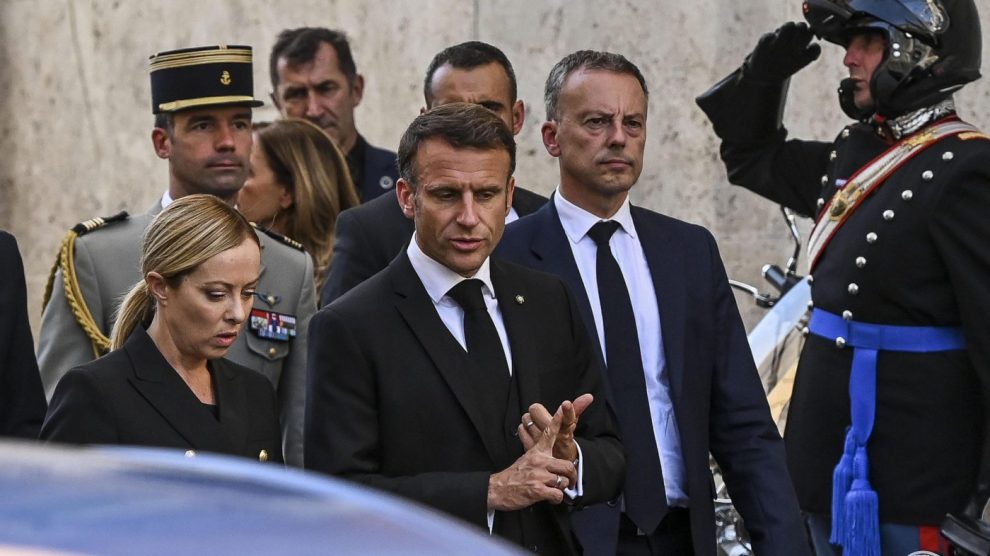The Meloni-Macron bilateral. On Tuesday, right after the funeral service for the late President Emeritus Giorgio Napolitano ended, the Italian Prime Minister and the French President met in Rome and spoke for over an hour, face to face, without their delegations. An official note from the former’s office describes a “long and cordial meeting” where the two leaders “discussed the main international issues, with particular attention to the management of the migratory phenomenon and Europe’s economic priorities ahead of Friday’s ‘Med 9’ summit in Malta and next week’s informal European Council in Granada.”
- The meeting signalled Paris’ increasing engagement on the migratory issue. Italy has been asking its European partners to help it manage the migratory flow, which has more than doubled since 2022 and tripled since 2021, with over 133,000 landings so far this year.
From clashes to cooperation. The leaders’ meeting is the latest positive twist in Rome and Paris’ often testy dialogue on migration. Over the past weeks, French officials had reacted to a spike in irregular migrant landings by closing the border with Italy, causing the latter to protest and the EU’s Court of Justice to quickly strike down the decision. The mood got better over the weekend, with President Macron vowing to “work together” to combat irregular migration and PM Meloni reacting “with great interest” to the proposal.
- “We cannot leave the Italians on their own,” said the French President in a televised interview, noting that most of the migrants arriving by sea in Lampedusa “come from sub-Saharan Africa, from countries to which we provide development aid.” Thus, Paris must aid Rome if the latter agrees to “help us dismantle the smuggling organisations.”
- That stance is in perfect alignment with PM Meloni’s line on migration. “It is clear that Italy, France and the EU must act together to support migrants’ states of origin and to help transit states dismantle criminal human trafficking networks,” she argued, noting that the Italian government is already working towards that goal and wants to pursue it together with EU institutions and European allies.
What it actually means. As noted by Corriere della Sera, during that televised appearance, President Macron explicitly spoke of the active and fruitful cooperation between the British and French governments to dismantle the network of traffickers around Calais. Paris intends to apply the same model with Rome: that entails destroying the logistical means of traffickers – which means boats, means of transport, and local networks that facilitate the departures – even if it comes to approving special and undercover operations.
- “These are ambitious goals, but they obviously find our Prime Minister more than interested,” noted the Italian paper.
Tajani flies to Paris… Then, on Monday, Italian Foreign Minister Antonio Tajani travelled to the French capital to meet with his French counterpart Catherine Colonna. He reiterated that Italy and the government had “very much appreciated” President Macron’s words, stressing the seriousness of the issue for Rome and noting that Paris’ desire to work elicited its “willingness.”
- “The migration issue must be tackled at the European level,” he said, adding that because of the instability in Africa France and Italy believe that the United Nations must “intervene through the International Organization for Migration and the UNHCR.”
- He then noted that Rome and Paris can contribute to building a European solution to reviewing the migratory framework – which will likely be discussed at the informal EU Council next week.
- Finally, he said he would raise the issue of migration with his German counterpart Annalena Baerbock on Thursday when he’s expected in Berlin.
Et tu, Germany? The European heavyweight has been mulling a review of its liberal immigration rules – whilst trading blows with the Italian government. On Sunday, Defence Minister Guido Crosetto criticised Berlin’s plan to financially support civilian and nongovernmental sea rescue operations that tend to drop off rescued migrants in Italy – with the German Foreign Ministry declaring to Italy’s Ansa that rescuing people at sea is a “legal, humanitarian and moral duty.”
- Germany’s “very serious” move ignores Rome’s request for solidarity and assistance, argued Minister Crosetto. “Berlin pretends not to realise that, in doing so, it causes difficulties to a country that in theory should be a friend,” he told La Stampa.
- He then recalled that NGOs account for roughly 5% of rescues at sea, while Italian institutions such as the Coast Guard and Navy carry out most of the rescues.
- “If Germany had the fate of people in distress at heart and really wanted to help us save lives, it could help build what we call the ‘Mattei Plan’ for Africa, seriously combat the criminals who traffic in human beings, and lend a hand to the military and civil institutions of the Italian Republic,” concluded Minister Crosetto.





